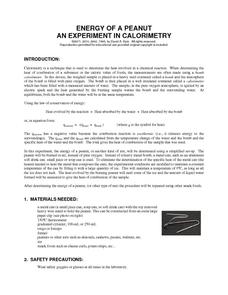Curated OER
Heat of Combustion Lab
In this heat of combustion lab, students measure the heat of combustion for paraffin wax, butane, and cheetos. Students will apply the 1st law of thermodynamics to calculate the heat lost by the fuel and the heat gained by the water to...
Chymist
Energy of a Peanut
Are you nuts? An engaging experiment burns nuts to find their kilocalories. Young chemists analyze at least two different types of nuts with their experimental results versus what is on the package. The resource offers a great lab for...
Curated OER
Ice Ain't Easy
Students are introduced to the laws of thermodynamics. The 1st law of thermodynamics states that the energy must be conserved when two objects of different temperatures come in contact. If one object gains energy, the other object must...
Curated OER
The Heat of Fusion of Ice
Students measure the heat of fusion of ice. In this heat of fusion lesson plan, students use a calorimeter or Styrofoam cup and thermometer to measure the change in temperature of the water in their calorimeter. This allows students to...
Virginia Department of Education
States of Matter
Scientists have been studying exothermic reactions before they were cool. The lesson begins with a discussion and a demonstration of heat curves. Scholars then determine the heat of fusion of ice and the heat needed to boil water through...
University of California
Hot! Hot! Hot!
Calories are not tiny creatures that sew your clothes tighter every night, but what are they? A science lesson, presented at multiple levels, has learners experiment with heat, heat transfer, and graph the function over time. It also...
Nuffield Foundation
How Much Energy Is There in Food?
People associate calories with food, but what is a calorie? Young scientists measure the number of calories in samples of food to better understand the concept. They test a variety of samples, take measurements, and compare their results...
Kenan Fellows
What Is Heat?
If objects have no heat, how do they can gain and lose it? Scholars experiment with heat, temperature, and specific heat of various substances. They create definitions for these terms based on their own conclusions to complete the fourth...
Curated OER
The Energy Debate - Energy of Peanut
Students articulate the difference between the terms heat and temperature. They calculate the amount of energy associated with a given temperature rise and design an experiment to measure the energy of a fuel.
Curated OER
Thermochemistry
In this thermochemistry worksheet, students answer 6 questions about specific heat, heat capacity and molar heat capacity. They also complete a crossword puzzle given 20 clues about topics related to thermochemistry. Students solve a...
Curated OER
Ice Ain't Easy
Learners are told that objects in contact with one another reach an equilibrium temperature. A hot object placed in a cool liquid always cool off. It never happens that the object gets hotter and cool liquid gets colder. Students predict...
Curated OER
Review for Thermodynamics Quiz
In this thermodynamics worksheet, students review kinetic and potential energy, enthalpy, entropy, and standard hear of formation. This worksheet has 1 short answer and 5 problem solving questions.
Curated OER
Calorie Connection
Students calculate the calories in a Brazil nut and the calories needed for daily intake. In this calories lesson plan, students use calorimetry to measure the change in water temperature heated by the burning of a Brazil nut. They also...
Curated OER
Heat Transfer
The students construct a heating curve and explain its components. They perform calculations. They review phase changes and quantify Energy differences. They review phases of matter and their energy content.
Curated OER
Hess's Law
In this reactions learning exercise, students use Hess's Law to calculate the heat gained or lost by different reactions. Students determine if the reaction would occur spontaneously at a given temperature. This learning exercise has 9...
Curated OER
Heat of an Unknown Metal
Eighth graders complete labs to find the specific heat of many different types of substances, and use characteristic property to identify an unknown metal. CBL be used to determine energy lost or gained, and students complete a...
Curated OER
AP Chemistry Thermochemistry 2
In this thermochemistry worksheet, students solve a variety of problems including finding heats or reactions, determining specific heats of substances, finding the amount of energy released in a calorimeter determining the final...
Curated OER
Chemistry Lab-Heat of Fusion
Students determine the heat of fusion of ice. In this heat of fusion lesson plan, students use a calorimeter to measure the molar heat of fusion of ice. Students determine the heat required to melt one mole of ice using hot water and ice...
Curated OER
Combustion
For this combustion pre-lab worksheet, learners determine the chemical equation for the reaction, define combustion and exothermic, and describe the molar heat of combustion. This worksheet has 14 short answer questions.
Curated OER
Thermal Energy and Heat Unit
Students explain that heat energy in a material consists of the disordered motions of its atoms or molecules. They know and explain that transformations of energy usually transform some energy into the form of heat, which dissipates by...





















